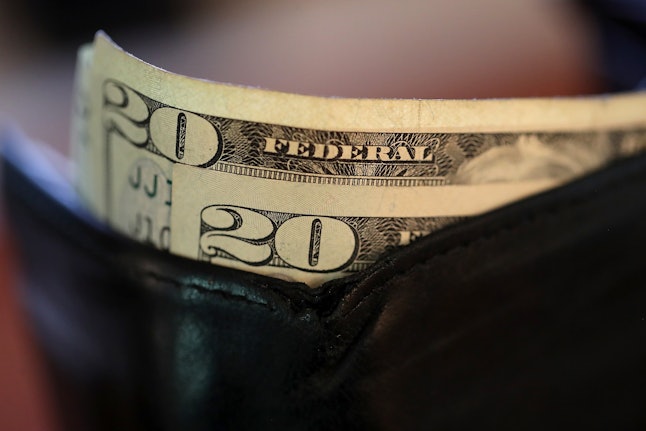
Given these factors, you’ve got some major potential for disrupted sleep. Even if you absolutely love the holiday season, all the added stress and activity can really add up — as your sleeping hours diminish. Regardless of how much fun they can be, there are a number of ways that the holidays can affect your sleep.
Whether you’re up late sharing holiday cocktails with friends, wrapping presents, or scrambling to get to the airport on time, prioritizing your sleep during the holidays is so important.
Getting adequate shut-eye will help you deal with holiday stress while keeping your immune system strong, the National Sleep Foundation says. By managing the different stressors that might be sabotaging your rest this holiday season, you can enjoy the festivities without sacrificing your sleep — because no one likes a cranky holiday party-goer.
Here are nine ways that the holidays can affect your sleep, and what to do about it.
1. Added Stress
Hannah Peters/Getty Images Sport/Getty Images
The holidays can be one of the most stressful times of the year. According to the National Sleep Foundation, stress is a major contributor to insomnia and sleep problems. Stress can contribute to pre-bedtime racing thoughts and tension, making it difficult to fall asleep and stay asleep. Meditation, exercise, or backing off of any commitments that are overwhelming you, can help you manage your stress so you can rest well during the holiday season.
2. Holiday Foods
The Iowa Sleep Center says that alcohol, turkey, caffeine, and and sugary foods can sometimes disrupt your sleep. While enjoying holiday foods can be special part of the season, if you notice that you don’t sleep well after eating certain foods, avoiding them, or just eating less of them, might help.
3. Increased Anxiety & Depression
Anxiety and depression can increase during the holiday season for a number of reasons, according to the Anxiety and Depression Association of America (ADAA). Grief and loss, social anxiety, or holiday travel can all trigger anxiety and mood issues. By avoiding over-scheduling, and drawing up a game plan for dealing with social events and travel if you feel anxious, you can gently confront your fears while not overloading yourself, ADAA says.
If you’re dealing with loss and the holidays are too difficult right now, only participate in the ways that feel OK for you. Managing any mental health issues you might be facing in ways that work for you is key to keeping healthy sleep patterns in place year round.
4. Financial Stress

Justin Sullivan/Getty Images News/Getty Images
Financial stress during the holidays can take a toll, and money worries can seriously mess with your sleep. The costs of gift-buying, travel, and holiday dinners out can overwhelm your budget. By setting up a spending plan, sticking to it, and carefully deciding on the purchases you want to make, you can keep your spending in check while reducing your stress load over the holidays.
5. An Over-Packed Schedule
Trying to squeeze in a bazillion holiday commitments, like work parties, family dinners, volunteering, or time with friends means that something has to give somewhere. An overloaded schedule can bulldoze your bedtime routine, and no one needs that. Pick and choose the holiday events that are most meaningful for you, and allow yourself to say ‘no’ to anything you can’t fit in.
6. Late-Night Parties
While late-night festivities are part of what makes the holidays so fun, too many parties into the wee hours can mean that you’re not getting enough sleep overall. Make sure to have some boundaries with your schedule during the work week, and give yourself time to sleep in the next day when you do stay up late.
7. Overexposure To Lights At Night

Theo Wargo/Getty Images Entertainment/Getty Images
Lots of twinkling holiday lights mean that you might not be getting enough shut-eye in the dark come bedtime. Shutting all your lights off, using black-out curtains, or even a simple sleep mask, can help you sleep more deeply.
8. Family Issues
The holidays sometimes have a way of dredging up old arguments, complex family dynamics, and unresolved issues. If you know that there could be arguments at the Christmas dinner table, or you’ve got a particularly contentious relative, plan ahead for what you will and won’t engage in. Getting upset, or potentially getting triggered with any family traumas that you have, can seriously disrupt your sleep. So make sure to take care of you, and set boundaries when you need to.
9. Travel

Bruce Bennett/Getty Images News/Getty Images
Travel can super fun, but it also causes (not so fun) jet lag if you’re switching time zones. Getting a good night’s sleep before you fly, staying hydrated on the plane, and adjusting your schedule to your destination as soon as you can when you arrive, can help you recover from jet lag more quickly, according to the Mayo Clinic.
Even if you’re not jet lagged, long car rides, and sleeping in unfamiliar places like a hotel or guest room, can also mess with your sleep. Aiming to stick to your regular sleep schedule can help.
Taking a warm shower, meditating, journaling, and using sleep masks and ear plugs can all help you rest better when you’re away from home, The National Sleep Foundation says.
While the holidays can present some challenges to your bedtime routine, planning ahead, minimizing stress, and setting some boundaries where needed, can all help ensure that you enjoy the festivities — without sacrificing your precious sleep.
If you are traveling during the holidays, don’t leave your good sleep at home. Alaska Sleep Clinic has all of the travel CPAP devices that are easy to pack and carry, no matter the distance. Check out the choices on line or in any of our four labs in Alaska, including Anchorage, Wasilla, Soldotna and Fairbanks.









